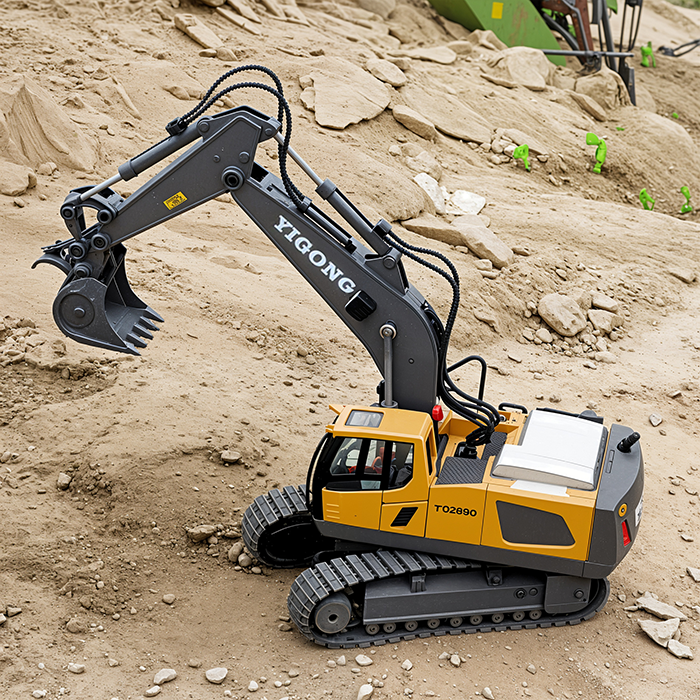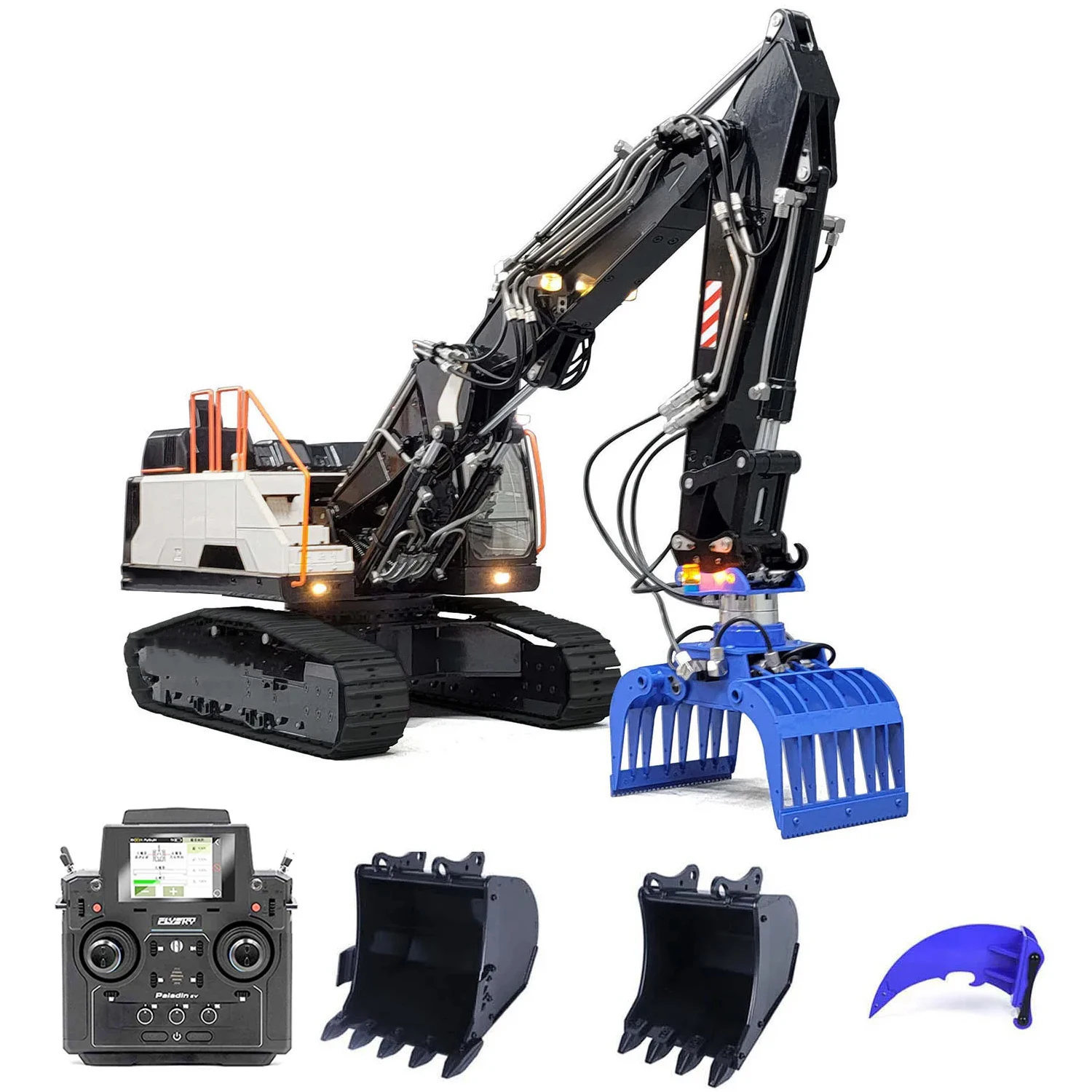Comprehending Just How Excavator Works and Its Effect On Effectiveness
Excavators play a necessary function in building and mining operations, depending on a complicated interplay of hydraulic and mechanical systems. Their capability to carry out a variety of tasks rests on both their layout and the innovation integrated within. Understanding these parts can substantially affect operational performance and efficiency. As developments remain to improve the market, one must consider how these modifications will certainly influence future techniques and efficiency.
The Basics of Excavator Mechanics

The Function of Hydraulic Solutions in Excavators
At the heart of excavator operation exists the hydraulic system, which plays a pivotal duty in powering the equipment's functions and activities. This system uses pressurized hydraulic liquid to move energy, allowing different activities such as moving, training, and excavating. By utilizing the concepts of hydraulics, excavators can do jobs with exceptional accuracy and pressure, improving overall operational efficiency.The hydraulic system is composed of vital parts, including cylinders, pumps, and valves, which interact to regulate the flow and instructions of the fluid. When the driver involves the controls, the hydraulic liquid is routed to certain cyndrical tubes, translating the driver's commands right into physical movement. This device permits responsive and smooth actions, which are important in building and construction and excavation atmospheres. double e volvo rc excavator. The effectiveness of the hydraulic system directly impacts the efficiency and versatility of the excavator, making it a vital component in modern excavation processes
Key Components of an Excavator
Understanding the vital components of an excavator is crucial for grasping exactly how this effective equipment operates. An excavator consists of numerous substantial aspects, including the undercarriage, residence, boom, arm, and pail. The undercarriage provides stability and wheelchair, typically featuring wheels or tracks to navigate various terrains. Your home consists of the engine and hydraulic systems, allowing the operator to control motion and power the equipment. The boom expands from the home, making it possible for vertical reach, while the arm links to the pail, promoting digging and lifting operations.Additionally, the taxi houses the operator, furnished with controls for accurate maneuvering. Each of these parts plays a vital role in the excavator's general performance, adding to its effectiveness and performance on construction sites. Comprehending these parts aids in preserving and maximizing excavator performance, making sure tasks are finished securely and efficiently.
Accessory Convenience and Its Benefits
Attachment versatility is a necessary aspect of excavators, allowing operators to switch in between different devices customized for certain jobs. This flexibility not only enhances job effectiveness yet likewise adds to cost-effectiveness by minimizing the requirement for numerous machines. Understanding the different kinds of add-ons offered can significantly impact the general efficiency and capability of an excavator on task sites.
Sorts of Add-ons
While excavators are primarily recognized for their excavating abilities, their real flexibility exists in the wide range of accessories offered. These add-ons enhance the excavator's functionality, enabling it to carry out different tasks beyond excavation. Usual attachments include pails (for excavating and scooping), hydraulic thumbs (for grasping products), and augers (for drilling openings) Grapples are utilized for managing and moving debris, while rippers can damage up tough surface areas. Various other specialized accessories, such as trenchers and plows, make it possible for excavators to adjust to specific job requirements. This variety not only boosts the machine's utility throughout various industries, consisting of building, landscape design, and demolition, but likewise enables drivers to customize their equipment to meet details project demands efficiently.
Boosted Work Effectiveness
Maximizing work effectiveness is a key benefit of using numerous excavator add-ons. Various attachments enable an excavator to carry out numerous tasks without requiring to change equipment, conserving important time and labor. For circumstances, using a hydraulic hammer can damage concrete while a pail accessory can excavate soil, enabling a seamless operations. This versatility minimizes downtime related to tools modifications and boosts efficiency on-site. In addition, specialized add-ons boost accuracy in tasks such as grading or landscape design, causing greater high quality results. The capability to adapt to various job demands not only simplifies procedures but also lessens the requirement for additional equipment, making sure that jobs are finished promptly and successfully. Generally, add-on adaptability considerably contributes to increased job performance in excavation work.
Cost-Effectiveness and Versatility
Cost-effectiveness is a considerable advantage of utilizing functional excavator attachments. These add-ons enable a single excavator to perform multiple tasks, lowering the demand for added equipment and labor - double e volvo rc excavator. By switching over in between pails, hammers, and grapples, drivers can tackle various tasks, from excavating to demolition, consequently optimizing tools utilization. This versatility not just decreases operational expenses however likewise decreases downtime associated with altering equipment. Additionally, the ability to customize excavators with specialized accessories improves productivity, as they can efficiently handle varied tasks according to project demands. In conclusion, the mix of cost-effectiveness and flexibility in excavator accessories adds to improved operational efficiency and resource appropriation in construction and excavation projects

Advanced Modern Technology in Modern Excavators
Modern excavators are progressively outfitted with advanced innovation that transforms excavation processes. Automation streamlines operations, while boosted fuel effectiveness minimizes functional costs. Additionally, wise control systems enhance precision and security, noting a substantial development in excavation devices.
Automation in Excavation Processes
As excavation modern technology progresses, automation has actually become a crucial element in enhancing performance and precision on task websites. Modern excavators are equipped with sophisticated automated systems that facilitate tasks such as grading, excavating, and trenching with very little driver intervention. These systems utilize sensing units, GPS, and artificial intelligence algorithms to assure exact positioning and deepness control, greatly minimizing the margin for error. Furthermore, automation enables operators to concentrate on calculated decision-making rather than hand-operated controls, bring about enhanced productivity in general. Such advancements not only streamline process but likewise improve safety by lessening human error in complicated procedures. The combination of automation in excavation processes represents a considerable development in construction technology, driving the sector towards better performance and effectiveness.
Improved Gas Effectiveness
Improvements in innovation have actually additionally caused considerable enhancements in gas performance for contemporary excavators. Modern equipments are equipped with advanced engines that enhance power result while lowering gas intake. These engines utilize cutting-edge burning modern technologies, such as turbocharging and straight gas shot, to enhance performance and efficiency. Additionally, light-weight products in building and construction reduce general weight, enabling much less energy expenditure throughout procedure. The introduction of variable rate controls makes it possible for operators to change engine performance according to specific jobs, better lessening fuel usage. Because of this, these enhancements not only lower operational costs however likewise contribute to environmental sustainability by minimizing discharges. In general, enhanced gas performance in excavators is a crucial Visit This Link advancement that bolsters productivity and financial feasibility in the construction market.
Smart Control Systems
While operators navigate progressively complex work sites, wise control systems in excavators have become essential devices for improving efficiency and precision. These advanced innovations use sensing units and formulas to keep track of different criteria such as load weight, surface problems, and operational performance. By immediately adjusting hydraulic features, smart systems enhance machine performance, resulting in improved performance and lowered endure parts. In addition, drivers take advantage of intuitive interfaces that offer real-time responses and diagnostics, permitting informed decision-making. This combination of modern technology not only improves operations yet also minimizes human mistake, contributing to much safer job settings. As the building sector continues to advance, clever control systems will certainly play a crucial function in shaping the future of excavator performance and effectiveness.
Enhancing Operational Performance With Excavators
Excavators play a vital function in boosting functional effectiveness throughout various building and excavation tasks. Their versatility permits numerous jobs, consisting of excavating, training, and material handling, which simplifies workflows and reduces the demand for added tools. With powerful hydraulic systems, excavators can carry out durable tasks with precision, substantially reducing the moment required to total tasks. The integration of advanced innovation, such as GPS and automated controls, even more maximizes their operation, making it possible for drivers to achieve better accuracy and lower product waste. Additionally, modern excavators are made to eat much less fuel and reduce discharges, adding to both expense savings and ecological sustainability. By making use of excavators effectively, construction teams can improve efficiency, meet task target dates, and enhance overall site management. This multifunctionality and effectiveness make excavators vital tools in the modern-day building landscape.
The Future of Excavators in Construction and Mining Industries
As the construction and mining industries develop, the future of excavators is positioned for considerable change driven Look At This by technical development and transforming operational demands. Advances in automation and fabricated knowledge are improving excavator capabilities, allowing for boosted accuracy and performance in operations. Autonomous excavators are emerging, minimizing the demand for human intervention and reducing the risk of accidents.Moreover, the assimilation of telematics and IoT modern technology makes it possible for real-time surveillance of maker efficiency and predictive maintenance, enhancing uptime. Green layouts, consisting of electrical and hybrid designs, are gaining traction, aligning with sustainability objectives within the industry.Additionally, the usage of sophisticated materials and lighter designs boosts gas performance while preserving performance requirements. As these fads progression, excavators will certainly play an important role in fulfilling the increasing demands for performance and security in building and mining, eventually transforming functional landscapes.
Regularly Asked Questions
How Do Climate Problems Influence Excavator Performance?

Climate conditions significantly influence excavator efficiency, as rain and mud can impede grip and stability, while extreme temperatures may impact hydraulic systems. Operators must adapt to these variables to guarantee excellent functionality and safety throughout procedures.
What Safety And Security Actions Should Operators Adhere To While Making Use Of Excavators?
Security procedures for excavator operators consist of using proper individual safety tools, carrying out pre-operation inspections, ensuring proper interaction with ground employees, preserving a risk-free range from overhanging threats, and adhering to well-known functional protocols to avoid accidents.
Just How Frequently Should Excavators Be Preserved for Ideal Efficiency?
Excavators ought to be maintained consistently to ensure peak efficiency, generally every 250 operating hours or as defined by the supplier. Routine checks boost reliability, avoid unforeseen failures, and extend the life-span of the equipment.
What Is the Average Lifespan of an Excavator?
The typical life expectancy of an excavator typically varies from 10,000 to 15,000 hours of procedure. Elements influencing longevity include upkeep practices, running problems, and the top quality of the machine itself, impacting overall efficiency and effectiveness.

Can Excavators Operate Irregular Terrain Effectively?
Excavators can operate successfully on irregular surface because of their expressed layouts and adjustable tracks. These attributes allow them to preserve security and traction, enabling effective operation in difficult environments commonly encountered in building and construction and landscaping jobs. Each of these elements plays an important role in the excavator's total capability, contributing to its effectiveness and performance on building sites. Maximizing work efficiency is a main benefit of using Check This Out numerous excavator attachments. While drivers navigate significantly complex work sites, clever control systems in excavators have arised as necessary tools for improving effectiveness and precision. Excavators play an important duty in boosting operational performance across different construction and excavation jobs. Breakthroughs in automation and artificial knowledge are improving excavator abilities, enabling for boosted accuracy and efficiency in procedures.